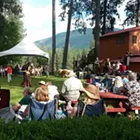For the third straight mayoral election, the River Park Square issue looms large. As it has now landed on a legal track to an April court date, it may not be as big an issue as it was in past elections. But it remains one of the biggest, as millions have been spent defending the city's interest, with millions more on the line when the case is decided.
Although Mayor John Powers inherited the situation, he is being held responsible for the failure of his preferred solution: mediation. Powers reorganized the legal strategy after taking office, in part to allow mediation to work. So far, it hasn't, and some challengers are saying he shouldn't have changed course. Others think Powers didn't do enough to find a solution that would allow the city to move on.
"There were opportunities missed during his first year," says Chris Marr, chairman of the Spokane Area Chamber of Commerce.
Nonetheless, most recognize that they will likely be stuck with much of the legal strategy that has been developed to date.
"There's no way that I can go out and hire a new lawyer without jeopardizing our case, and I don't have a lot of confidence in our case," says Steve Corker. "To me, with all the disclosure, there's only one solution: a third, a third, a third. It's basically saying, the city didn't do due diligence. The Cowles sold a bill of goods, and quite frankly their description of expectations went way beyond what was appropriate, and for them to take the argument that a deal's a deal is wrong. And then there's the people who put it together: the rating agencies, the consultants, the lawyers."
Corker says he would review the case if elected and tweak the strategy to force a settlement, if possible. He says he would "be all over" the RPS special counsel, Laurel Siddoway, to make sure the case was going the way he thinks it should. Corker believes that when the mayor dropped the strategy developed by Yale Lewis, which included potential criminal charges, the impetus to settle went away.
"It was na & iuml;ve to think you'd be able to force Betsy [Cowles] to the table," says Corker. "If this is a demonstration of his legal skills, I can see why he left [his law practice]."
And Tom Grant, who has investigated and reported on the issue for several years, is even more strident. While he also says Siddoway would likely stay with revisions to the strategy, he adds that "People have to be held accountable. The IRS looking into it criminally is appropriate, and the SEC should look into it. I believe the local federal prosecutor should examine the case to see if there was any criminal wrongdoing. The best thing we're going to get out of RPS is a cleansing -- that this is a city in which corruption, which hasn't been proven yet, will not be allowed."
Powers believes his strategy is sound. "The Yale Lewis approach was a million-dollar motion that got us nowhere," he says.
Powers says he promised to protect the interests of the taxpayers, which he claims to be doing. "We didn't roll over; we stood up to a large special interest. This is a financial problem of a magnitude north of $40 million, and that's why we're fighting hard. I still hope we can mediate it, but we have redirected this case in a more traditional track. It is framed properly and in the right court."
James West was labeled in the 2000 election as the "deal's a deal" guy, seemingly standing for simply having the city live up to its commitments -- a position not widely embraced. This time around, he's more careful. "I was wrong three years ago when I said a deal was a deal," says West, "because we didn't have all the facts then."
West says he would review the case in January by bringing in one or two outside attorneys to take a look to see if the strategy is sound.
Sheri Barnard hopes it can be solved before going to court. She says the lesson learned centers on when the problem started: when the people weren't allowed to vote on the plan.
"I would have insisted on a public vote," says Barnard. "It's no different than the incinerator. The public wanted to vote, and the council said no."
Barnard says on her watch, any strategy or settlement would be handled cooperatively between her and the city council.
Comments? Sound off at letters@inlander.com.
Publication date: 08/14/03




















